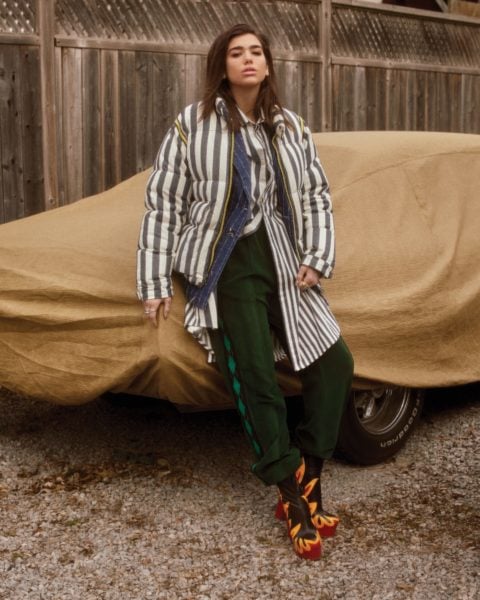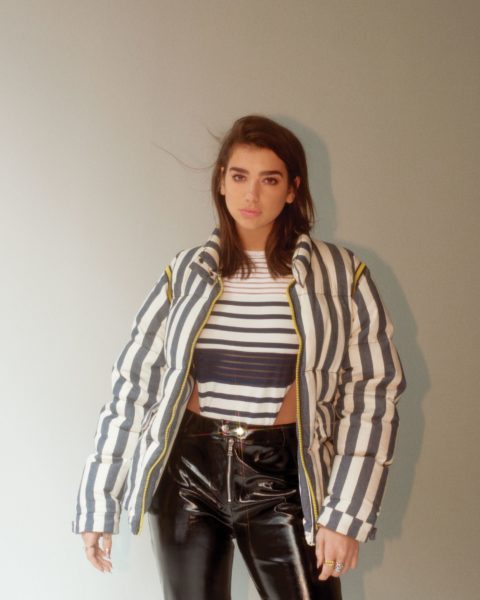FASHION Magazine February 2018: Dua Lipa
Dua Lipa doesn’t have a cold, exactly.
The gold standard of celebrity profiles is “Frank Sinatra Has a Cold” by Gay Talese, published in Esquire back in April 1966, when Sinatra was arguably the most powerful celebrity in America. Unlike other celebrities at the time, he didn’t need the publicity; he didn’t need to be in a magazine. Sinatra created and sold his own narrative, and so he refused to speak with Talese.
What made the profile so impressive is that, apparently, Talese didn’t need to talk to him, either. “Frank Sinatra Has a Cold” is an account of Talese trailing Ol’ Blue Eyes, studying him and the constellation of stars, strivers and crooks in his orbit. No matter how often young journalists without access try to cop the premise, or how often they reference and riff on the groundbreaking feature, it only really worked when Talese did it. It turns out you need a Frank Sinatra in 1966 to pull it off.
Dua Lipa is not Frank Sinatra in 1966. And, strictly speaking, she doesn’t have a cold, either. She has strep throat. And it’s ruining her day. Just like Sinatra’s cold ruined his.
Actually, it’s ruining a lot of people’s day, including all her fans in Montreal, who won’t be able to see her in concert tonight. She was supposed to fly there after this photo shoot in Toronto, but that isn’t happening anymore. Maybe more than the strep symptoms, having to cancel her show is what’s really bringing her down. When I arrive at the studio in the afternoon, it feels like I’m walking into a funeral. The air is charged with the silence that erupts after someone unintentionally says something too real. Lipa is leaning against a random automobile. The pose could almost be mistaken for sultry, but when you look closer, you realize she’s leaning against the car for support.

Lipa looks like she might cry. I’m not Talese, but I bet even he’d have trouble profiling a pop star who’s too sick to stay vertical. Sinatra only had a cold; Lipa is thousands of kilometres from her home, with an infection in her throat that’s preventing her from doing the thing that gives this whole ordeal meaning. Without a voice, she has no purpose here. Her identity is broken. That’s not a fun situation.
Lipa looked a lot better last night.
The night before, at a club near Toronto’s waterfront, packed with party boys, swaying couples and squads of young women performing concerts within the concert, lip-synching her songs at one another, Lipa powers through tracks from her self-titled debut album.
After months of teasing singles, the album was released last June. By now, nearly everyone in the crowd seems to know every word to every song. Lipa twirls and sways, kicks and shouts across the small stage like a girl singing along to Pink in her bedroom. It’s joyful, strong and somehow personal. You wouldn’t know that she’d cancelled our interview earlier that day to protect and preserve her voice. Supported by an inconspicuous backing track, Lipa sounds perfect.
Now’s the perfect time to see her live. She’s at that magical point in her career where her global domination seems inevitable—and totally deserved—but she’s playing small-enough venues that she still feels like a cult favourite. To be clear, she’s not some underground artist: She has released seven singles—one of which went to number one—in the United Kingdom. She has performed at Glastonbury Festival and on The Tonight Show Starring Jimmy Fallon. But she’s not ubiquitous. Your parents don’t know her name. Fandom still feels like it means something. You can see it on the faces of the people here: All the acolytes of Gaga, Kesha or even Adele are raising their hands, bumping into one another while they dance, completely under the spell of their new pop saviour, who has healed herself, at least for the night.
Her people have made it very clear to us: Lipa is a musician, not a model. That is the story right now. Yes, she’s beautiful—she looks a bit like Kendall Jenner, actually—in a way that matches her lyrics perfectly: vulnerable, defiant, a little sad. And she has a bold, ’90s-inflected style that, like her music, is precisely of the moment. But, bless their hearts, her people shouldn’t be worried. Until some scandal or (who knows?) some global brand partnership, her music is still the most interesting thing about her.
She describes it as “dark pop”—music that you can both cry and dance to. Her lyrics are by turns cathartic, empowering, nostalgic and regretful. Her influences are omnipresent: the rolling emotion and vocal heft of Adele, the ferocious girl-power rock of Pink and the beats and self-creation of hip-hop. Because as empowering as her music sounds, the person she seems to be empowering the most is herself.
That tracks with her personal history, too. Lipa was born and raised in London. Even though, early on, a choir director told her that her voice was too low, her parents—especially her father, who used to be a rock musician—encouraged her. When she was 11, the family moved back to Kosovo, their homeland. But Lipa struggled there. She also knew there wouldn’t be as many opportunities there for her to fulfill her pop dream. When she was 15, she convinced her parents to let her move back to London.
She started posting videos of her singing covers on YouTube. She didn’t exactly blow up like Bieber, but she got noticed enough to be signed. And while it took some time for her to carve out her own sound from the mélange of influences, it’s easy to forget now, because that sound is so powerful and powerfully her own, that she’s only 22 years old. That’s barely a real human.
Almost a week later, on the phone from Washington, Lipa sounds 22. She also sounds better than she looked at the funeral photo shoot the week before. She says she’s getting better. She has a London accent, or at least I presume it’s London. If I were a linguist, I’d be able to tell exactly where she lives by the way she pronounces “me” (“me-eh”). She’s not bubbly.
Some people turn on the charm when they’re promoting themselves. Lipa sounds more like she’s been put on the phone to speak with a great-aunt she hardly knows. Her answers are short but complete. She’s even willing to joke a bit about inappropriate wedding songs. I suggest “Thong Song” by Sisqo. She says that for her own wedding, she’d get her grandparents dancing by dropping the filthy bass of “Pony” by Ginuwine—and warms up a bit after that. (She also, incidentally, recommends Jeremih’s “Birthday Sex.”)
Lipa is not like Frank Sinatra, except for the existential dread that comes upon her—the same way Talese described it falling on him—when she’s sick. “It really gets me down when I’m not able to go out and give a good show,” she says. “I feel helpless, and there’s nothing I can do about it.”
“It really gets me down when I’m not able to go out and give a good show. I feel helpless, and there’s nothing I can do about it.”
Sinatra refused to talk to his profiler as a power move. Whatever attitude I’ve ascribed to Lipa—whatever intention I’ve saddled her with—it isn’t fair. This is how fights start. This is the problem with us humans: We interpret the actions of others without knowing what’s inside their heads or their hearts. We do this to each other constantly, but we do it more aggressively to celebrities, because we have decided—and, frankly, been taught—that celebrities are inherently different from regular folks and so their behaviour can’t be judged in the same way we would judge our own behaviour or that of our family or friends. Then you take the fact that so many celebrities are so young and it’s a miracle we allow famous people to say or do anything except perform like trained monkeys. It’s a recipe for disaster.
But Lipa isn’t a disaster. She’s just…young. And ill. And probably really frustrated. Sinatra had power—that’s why his having a cold was meaningful. He could change lives on a sinus-infected whim. But Lipa doesn’t have that power. The fact that she had a shitty week—and still managed to give a performance that inspired many satisfied tweets—really only affected a handful of people (and all the fans in Montreal—can’t forget them). It just so happens that I was one of those people.
After cancellations and delays and silences from her people, in the end I speak to Lipa for about 25 minutes. But I saw her live. And I watched her suffer and retreat after three hours on the set of our photo shoot. That wouldn’t be enough material to write a profile that will still be studied by journalism students 50 years from now. Again, I’m not Gay Talese. But if I were Lipa, that would be enough to write a hit song.
“You can write about anything, really,” she tells me. “It can be someone you dated for six months or even someone you just spoke to at the bar who came across as such an asshole you didn’t really want to speak with him. One thing can inspire a completely-made-up scenario.”
It’s stretching, but I find this profound. It has an element of scripture—both completely benign and charged with meaning. Because, I’m doing the same thing. We hear lyrics that move us, that sound honest and true, but are only based on a true story. We read profiles about famous people, describing events that are documented, with dialogue that’s been recorded, that are still filled with conjecture and emotion that colour in between the lines. Example: One of Lipa’s biggest hits is “Hotter Than Hell.” It’s a three-minute banger made up of throbbing beats, religious imagery and sex. “Am I the answer to your prayers. I’m giving you the pleasure of heaven, and I’ll give it to you hotter than hell,” she sings.

“Getting up and performing my songs, I do feel very confident,” she explains. “But a lot of the songs come from a place that lacks that. Something I always wanted was a way to portray confidence in my music—trying to make myself feel better in certain situations. Like after someone didn’t think I was good enough, I wrote ‘Hotter Than Hell,’ which made it seem like he couldn’t get enough of me. I guess that makes me feel empowered.”
“Something I always wanted was a way to portray confidence in my music—trying to make myself feel better in certain situations.”
And it’s not the only song of hers like that. If other interviews are to be believed, she wrote “Blow Your Mind (Mwah)”—which, full disclosure, has been stuck in my head for about a week at this point—in response to an agent telling her she needed to lose weight. Like any artist, Lipa takes what she knows and makes it into something more meaningful. “It always starts with the words,” she says. “It always starts with the stories and what I want to say.”
Later, we talk about how intimidating it can be to go into a studio and tell strangers about not only the songs you want to write about and sing but the experiences that inspired them. “I realized that the only person who was going to get a real honest song out of me was me,” she says. “So I thought: ‘Fuck it. I’m going to speak my mind. I’m just going to do it for the sake of the music and the sake of me trying to get the best out of myself.’”
In that spirit, that’s the Lipa I’m deciding I met—not the one huddled against her boyfriend, leaving a photo shoot because she was sick and sad that she couldn’t perform for her Montreal fans, and not the one who seemed reluctant to talk. I met the real Lipa: the one who speaks her mind because she knows what’s best for her and she knows the stories she wants to tell—even when she’s sick.








